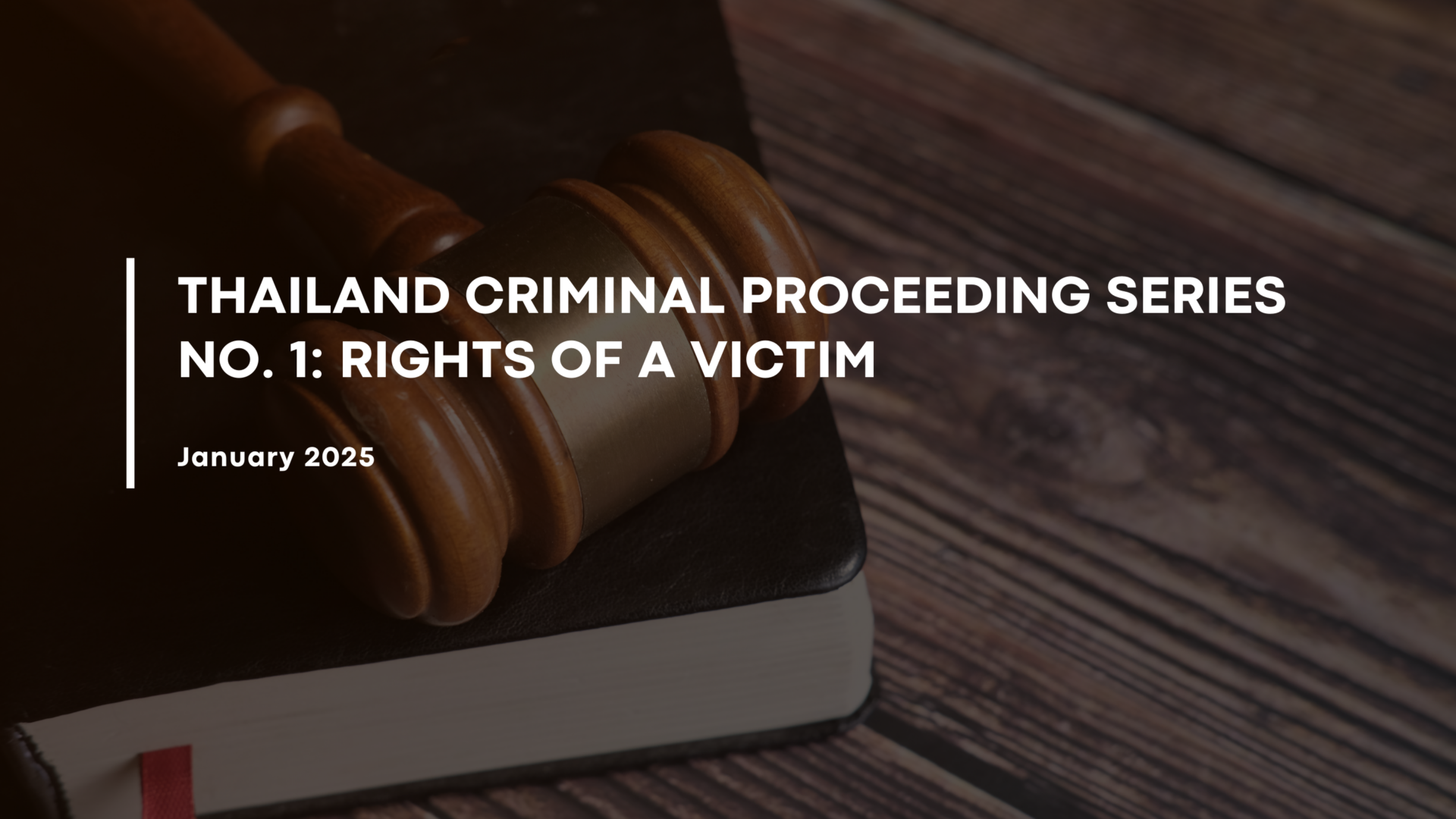Thailand Criminal Proceedings Series No.1: Rights of a Victim
17 January 2025
Understanding the rights of crime victims is crucial for ensuring justice and fair treatment within the legal system. This article delves into the definition of a victim according to the Thailand Criminal Procedure Code, as well as highlighting the distinctions between legal and non-legal victims. This article also explores the various stages of criminal offenses, relevant court judgments, and outlines the fundamental rights of victims in criminal proceedings. By shedding light on these aspects, we aim to equip individuals with the necessary knowledge to navigate their rights and the justice system effectively. This article is part of a short series on the Considerations of Criminal Proceedings in Thailand, where explore key factors) that are crucial to a successful trial strategy.
Who is a Victim?
A victim is defined under the Criminal Procedure Code as a person who has suffered damage due to the commission of an offense. Usually, victims suffer some sort of damage themselves, but in some cases they can also be victims even if some third party suffers the damage. In those scenarios, the definition of a victim can include other persons authorized to act on another’s behalf as well as legal representatives of minors, guardians of incapacitated individuals, and parents, descendants, or spouses of individuals who are deceased or severely injured.
It is important to establish that the victim is a legal victim. This means that the victim must have suffered damage from a criminal act and was not involved in the commission of the offense. Only as a legal victim can one exercise the right to take action against the accused or suspect who is claimed to have caused the damage. Interestingly, if the person was involved in the commission of the offense, even if he suffers damage from the crime, such person cannot exercise the rights of a victim to take action against those who caused the damage.
A legal victim can either be a natural person or a legal entity, such as companies and partnerships. In some cases, special laws grant the authority to certain individuals to act on behalf of entities that are not legal entities, such as a temple, or in cases where the land is held in the name of the Department of Administration. Some special laws in Thailand may grant a person or group of persons the authority to act as plaintiffs or defendants in legal matters related to the temple or religious monasteries.
Stages of a Criminal Offense
For most crimes, criminal offenses only include the actual act; mere intention or preparation does not constitute an offense. There are only certain offenses where preparation is considered a criminal act, such as preparing to commit arson. Generally, for an act to qualify as a criminal offense, it must actually be carried out. For example, if two people are arguing and one angrily begins to draw a gun from their waist but is stopped by a third party before using the gun, this would not yet be an act to commit the offense of murder.
To summarize, under the Criminal Procedure Code, a victim is defined as a person who has suffered damage due to the commission of an actual offending act.
Key Rights of Victims in Criminal Proceedings
- The right to file a complaint and withdraw the complaint
If you suffered damage, you can file a complaint with any relevant authorityAs the victim who filed the complaint, you can change or withdraw your complaint at any time. Withdrawing a complaint unrelated to a private offense does not prevent inquiry officials or public prosecutors from continuing their investigation or prosecution.
- The right to join as a co-plaintiff with the public prosecutor
In some circumstances, the case is not filed by the victim themselves or by their own private lawyers, but by the state through a public prosecutor, given that it is the assumption that when a crime against public order is committed, the state is also an injured person. If any criminal case has been filed with a court by a public prosecutor, a victim may file a motion requesting him or her to participate as a plaintiff at any stage of the proceedings before the court renders a judgement on the case.
- The right to compromise in compoundable offences
A motion for withdrawal of a criminal case may be filed at any time before the court of first instance renders its judgement. However, the court may or may not grant such withdrawal as the court deems appropriate. For example, if the defendant objects to the plaintiff’s motion for withdrawal which was filed after the defendant has submitted his defense, the court may dismiss the plaintiff’s motion for withdrawal, allowing the case to proceed.
Additionally, a case concerning an offence against private individuals may be withdrawn or settled at any time before the case becomes final, but if the defendant raises an objection, the court shall dismiss the motion for withdrawal.
- The right to request the court to order the defendant to pay compensation
It is important to note that in a criminal case where the public prosecutor is the plaintiff, usually the prosecutor will not request for remedy or compensation in the complaint. Where there are other third-party victims involved other than the state, in order to receive compensation, they must separately file a motion with the court to request compensation. In cases where the victim files a motion under the Criminal Procedure Code and the court schedules a hearing for the verdict, the court must notify the victim. If the court dismisses the criminal case or awards compensation less than requested, the victim must be informed of the right to appeal the civil part of the motion.
- The right to not answer questions that may directly or indirectly incriminate the victim as a witness
If the victim, acting as a witness in trial, is asked a question that might, either directly or indirectly, lead to them admitting to something that could compromise their own position with the law, they have the right to withhold any answers to questioning. If a question of such nature is asked during the legal proceedings, the court will usually inform the witness that they have the right not to answer. This rule helps protect witnesses from self-incrimination, ensuring they do not inadvertently say something that could result in criminal charges against themselves.
- The right to an interpreter or sign language interpreter
Legal proceedings, like inquiries, preliminary examinations, or trials, are typically conducted in Thai. If there is a need to translate a local Thai dialect or foreign language into Thai or vice versa, an interpreter will be asked to conduct the translations. If a victim, accused person, defendant, or witness cannot speak or understand Thai, or can only speak or understand a local dialect, the relevant authorities (inquiry official, public prosecutor, or court) are required to arrange for an interpreter. Similarly, if such individuals cannot speak, hear, or communicate, the authorities must either find a sign language interpreter or use other appropriate methods to ensure proper communication if there is no sign language interpreter present.
Conclusion
Understanding the rights of crime victims is a key component of Thailand’s legal justice system and is essential for ensuring justice and fair treatment for those within Thailand. It is crucial to understand exactly who is deemed or considered a victim and also consider what it means to be a victim according to the Criminal Procedure Code, including the key rights of victims in criminal proceedings and the stages of criminal offenses.
This article is part of a short series on the Considerations of Criminal Proceedings in Thailand, where we will continue to explore the nits and bits that are key to a successful trial strategy.
© PDLegal LLC
This article is intended to provide general information only and does not constitute legal advice. It should not be used as a substitute for professional legal consultation. We recommend seeking legal advice before making any decisions based on the information available in this article. PDLegal fully disclaims responsibility for any loss or damage which may result from relying on this article.
Further information
At PDLegal, we are committed to offering compassionate and expert legal support to victims of crime. Our team of experienced criminal law attorneys is dedicated to protecting your rights and guiding you through every step of the legal process. Should you have any questions on how this article may affect you or your business, please get in touch with the following persons:
Contributed by:
Paul Papon Charoenpao
Managing Partner PDLegal ThailandChambers & Partners – Asia Pacific 2023
PDLegal LLC is pleased to announce that Managing Partner, Peter Doraisamy, has been recognised and ranked by Chambers & Partners (Asia Pacific 2023 for Shipping: Domestic: Litigation). The following quotes appear with Peter’s ranking: –
“Peter Doraisamy of PDLegal in Singapore is a noted shipping lawyer in the market. He handles a wide range of disputes, including ship grounding, cargo and fraud-related cases” – Chambers & Partners – Asia Pacific 2023
“He is excellent in litigation. He has very good control of the case, collecting the right evidence and putting this into a very successful trial.” – Shipping Litigation Client
Chambers and Partners is the leading independent professional legal research company operating across 200 jurisdictions. Chambers and Partners delivers detailed rankings and insights into the world’s leading lawyers and law firms.
This ranking is a testimony to the expertise and experience of the Firm’s shipping practice and would not be possible without the support of our clients and friends.
View All Awards

We’re here to help you.
Whether you're seeking advice, representation, or have general inquiries, we're here to help. if you would like to speak to us for more information, please contact our client services team who will be happy to assist.
Let's Get In Touch
Our Office
- A:
PDLegal LLC Advocates & Solicitors 1 Coleman Street #08-02 The Adelphi Singapore 179803
- E:
- T:
- F:
(65) 6220 0392
- H:
Mon - Fri : 9:00 am - 5:00 pm Sat : 8:30 am - 12:00 pm










